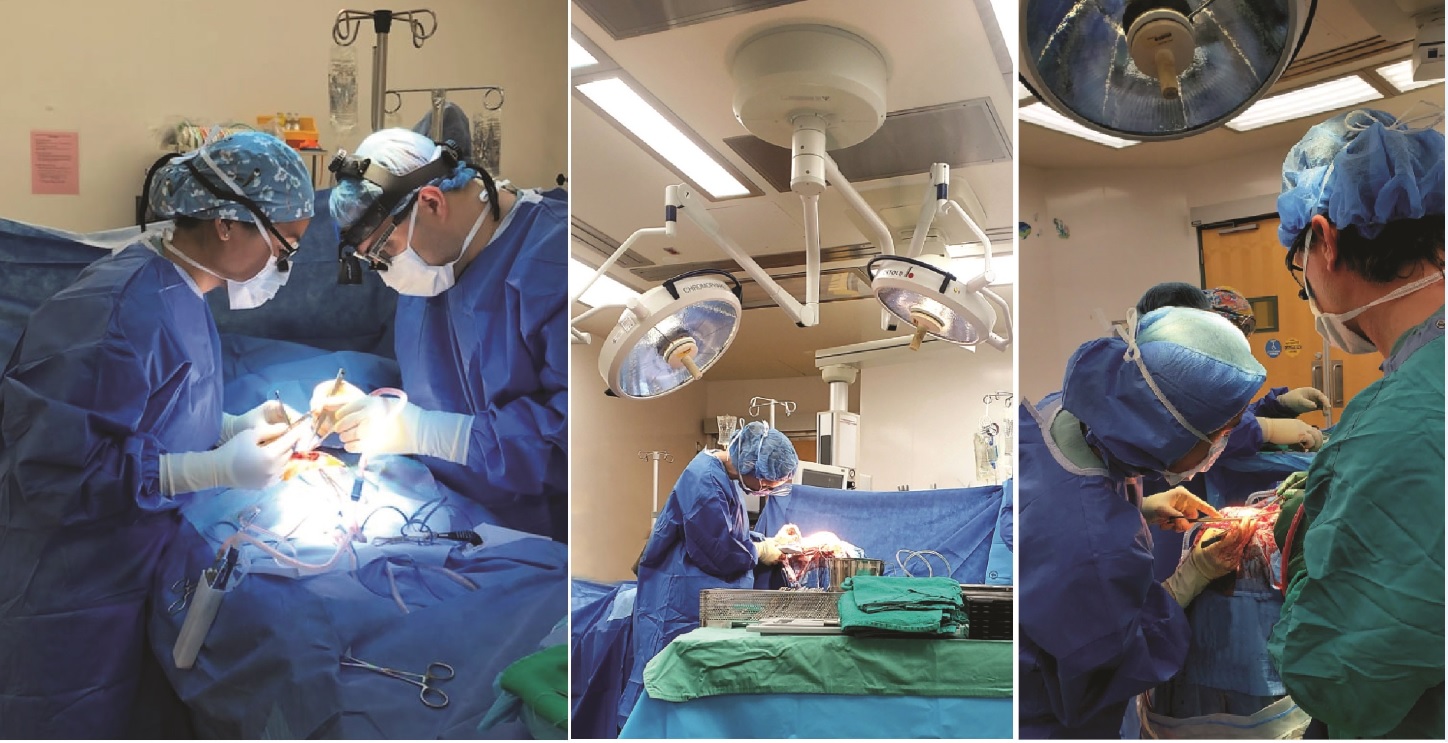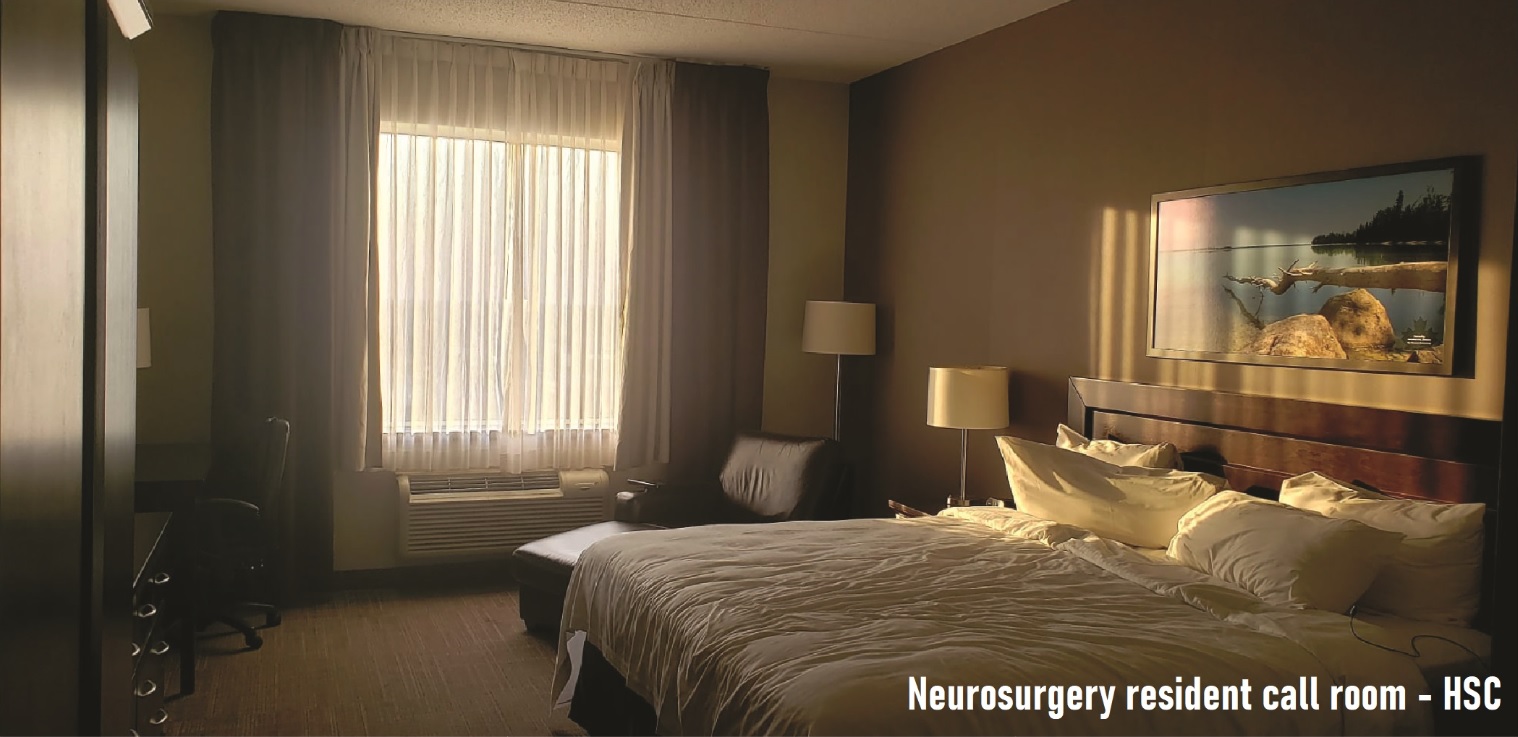Residency Training Program
The Health Sciences Centre and Winnipeg Children’s Hospital are the main sites associated with Neurosurgery residency training in Manitoba.
They are equipped with modern diagnostic equipment including 1.5 and 3T MR imaging (including the intra-operative MRI suite), high-resolution CT scanning, and angiographic capabilities.
Health Sciences Centre is also home to Canada's first Gamma Knife Unit, helpful in treating such conditions as metastatic tumors and vascular malformations, and significant in attracting clinical research.

The Section of Neurosurgery has a very close link with the Section of Neurology, which has a strong presence and teaching program at Health Sciences Centre—the General Hospital and Children's Hospital. There is a strong core of neuroscience teaching and research at the Manitoba Medical School, the Health Sciences Research Foundation, and the St. Boniface General Hospital Research Foundation
Residents are exposed to the full range of neurosurgical subspecialties, including epilepsy, neuro-oncology, vascular, spinal, functional, and pediatric neurosurgery. In addition to clinical neurosurgery, residents rotate through neurology, neuroradiology, and neuropathology, as well as other surgical and medical subspecialties.

Throughout their six years in training, residents are given increasing responsibility, culminating in overseeing the functioning of the neurosurgery unit during their final chief resident year.
Residents are encouraged to undertake research projects throughout their training. An optional research year of up to 13 periods is included within residency training in the Neurosurgery Program. Residents generally elect to conduct this research within their PGY 3 or PGY 4 years. Those residents who are interested in an academic career are advised to take an advanced degree. Many individuals choose to enroll in the Masters of Science Program open to residents in Surgery in Manitoba. This postgraduate clinical specialty certification program allows residents to earn the MSc as an additional degree to their certification.
All offices and clinics of the Manitoba Faculty of Medicine are side by side at Health Sciences Centre, making other residents and staff easily accessible. Academic days are held on site. The neurosurgery resident call room is a dedicated suite at the Canad Inns hotel which is attached to the hospital complex.

Program Overview
PGY1 and 2 (Transition to Discipline and Foundations of Neurosurgery)
The PGY-1 and PGY2 years are designed to fulfill the Neurosurgery and Surgical Foundations training requirements as set out by the Royal College of Physicians and Surgeons of Canada. This includes a maximum of 18 blocks to be undertaken in Neurosurgery, and includes additional core rotations in Critical care, General Surgery, Plastics Surgery, and/or other disciplines required to achieve competency in the Surgical Foundations Program and in the neurosurgery Transition to Discipline and Foundations of Discipline competency-based phases.
PGY4 (Research/Elective Year)
There is an opportunity in PGY4 to pursue up to 13 periods (1 year) of clinical or basic research training. Former trainees have used this time to pursue a M.Sc. or Ph.D. program, as supported by the Clinician Investigator Program, or to pursue a focused elective year in a subspecialty of choice.
This experience is typically planned well in advance, together with recommendations from the Program Director and Residency Program Committee, and must satisfy one of the following Royal College specifications as it relates to:
- Neurosurgery
- Related clinical or basic neuroscience disciplines
- Clinical or basic research
- Other scholarly activities
For those interested in research, further time may be spent obtaining an advanced degree. The Department of Surgery offers a Master’s of Science in Surgery program that residents are encouraged to consider.
PGY3 to 6 (Core of Discipline and Transition to Practice)
A formal 52 months of Neurosurgical training is incorporated in the PGY-3 to 6 years, focusing on an incrementally-graded increase in clinical responsibility and duties. During this time, there are expectations for regular participation on ward rounds, the operating room and in clinics. By the completion of residency, the resident will be proficient in the surgical and non-surgical management of all general types of neurosurgical conditions, in both adult and pediatric patients.
Given the breadth of expertise across the clinical faculty members, additional subspecialty exposure to all facets of Neurosurgery is also provided. During these years of training, the residents will achieve competency in the Core of Discipline and Transition to Practice phases of the Neurosurgery competency-based training. During the PGY3 to PGY6 years of Neurosurgery residents have the opportunity to rotate on Neurology and Neuropathology
